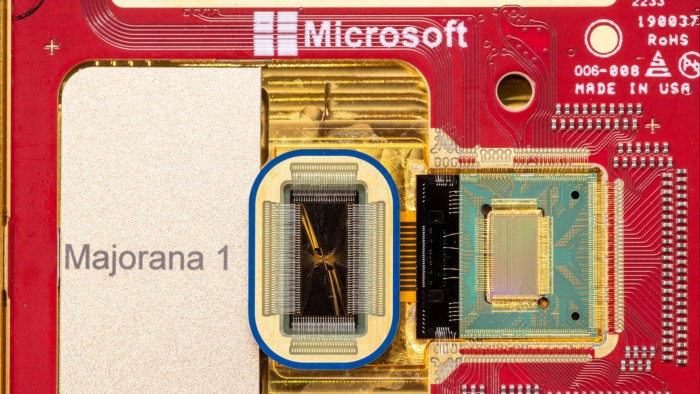Unlock the Editor’s Digest for free
Roula Khalaf, Editor of the FT, selects her favourite stories in this weekly newsletter.
In 1947, the first transistor, the basic building block for a digital computer, was made using a semiconducting material thought to be ideal for the task: germanium. The idea of using silicon didn’t come up until midway through the next decade, and it wasn’t until 1960 that a thin layer of oxidised silicon, found in today’s most widely used transistors, was added.
Quantum computing, the big hope for solving problems out of reach of today’s computers, is still struggling to reach its own silicon moment. Some of the biggest tech companies have started ramping up their attempts to build a working machine, convinced that the field has finally passed the threshold between interesting science experiment and practical engineering challenge.
Yet there is no consensus about the best way to make the most basic elements of quantum computers, known as qubits — or indeed, whether future machines will be based on an array of different technologies rather than just one, with different types of machine suited to different computing problems.
This lack of agreement on something so basic is a sobering reminder of how far quantum computing still has to go to prove itself. It also suggests that the race taking shape between some of the biggest tech companies is likely to produce winners and losers, as some qubits fail to pan out.
This week it has been the turn of Amazon, a relative newcomer to the realm of quantum hardware, to add to the multiplying array of technologies. Its entry, known as cat qubits, is named after Schrödinger’s Cat, one of the most misunderstood thought experiments in science (the Austrian physicist used his feline paradox to make the point that it was nonsensical to think that a cat locked out of sight in a box could be both alive and dead at the same time, contrary to what many believe).
Cat qubits trace their origins to research at Yale University a decade ago and were first pioneered by French start-up Alice & Bob, whose €100mn fundraising last month is a sign of growing confidence that the technology is ready to move beyond the lab. The components are designed in a way that suppresses one of the common types of error that affect all qubits, making them less prone to the “noise” that builds up inside machines as the systems gain in scale.
All quantum computers work by encoding information on multiple qubits to make up for the instability of each individual component. The less error-prone the qubits, the fewer the number needed. Amazon’s first rudimentary quantum chip, made from nine qubits, achieves the performance of other types of quantum chip using 50-100, according to Oskar Painter, the company’s head of quantum hardware.
The company’s progress, marked by a paper in Nature, follows Microsoft’s claim that it finally has something to show from its 20-year pursuit of an even more radical type of qubit, based on exploiting a new state of matter.
The two companies’ prototype chips — Microsoft’s Majorana 1 and Amazon’s Ocelot — are still years behind the leaders in the field, like Google’s Willow and IBM’s Heron. These and others are based on different types of qubit with a longer track record. Even if Microsoft and Amazon are right in claiming they have superior components, they have a long way to go to show they can be used to build practical machines that leapfrog the competition.
There are obvious parallels with the current race between the biggest tech companies to develop their own AI chips. Painter says Amazon’s aim in quantum is the same as it is in AI: while its cloud arm, AWS, plans to offer customers every type of chip on the market, its own in-house chip will act as the anchor. That makes the chip efforts, both in AI and quantum, of strategic importance to the biggest tech companies.
In quantum, much will depend on whether the race turns out to be a sprint or a marathon. Recent advances, like the progress in error correction Google reported last year, have brought optimistic estimates of a practical quantum computer by the end of the decade. Yet Nvidia CEO Jensen Huang shook the quantum world earlier this year with his estimate of 15-30 years, while Painter at Amazon predicts that working machines are still 10-20 years away.
If cautious estimates are correct, it is questionable how many of today’s quantum research efforts will survive. For even the best-funded start-ups, a wait of a decade would be punishing. And as the different quantum architectures are scaled up, some consolidation around fewer basic technologies seems likely.
Read the full article here




